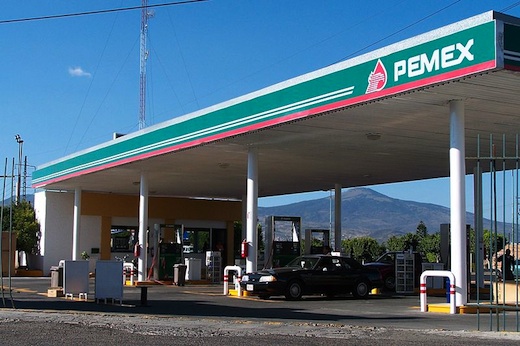
Mexican President Enrique Peña Nieto, of the right-center Revolutionary Institutional Party (PRI), has announced long awaited plans for allowing private industry to play a bigger role in the finances of the national oil company, PEMEX (Petroleos Mexicanos). This will soon take the form of legislation.
Mexicans in and out of government have, in recent years, been concerned that the once immense revenues from PEMEX have been dropping. Major shallow-water offshore oilfields give signs of being tapped out. In a decade production from the huge Cantarell oil field has dropped from 2.1 million barrels a day to 400,000. Meanwhile, exploration of deep-water resources, and also of shale beds and natural gas, are lagging. The government claims that only by bringing in foreign private capital can these new sources be developed.
Under the president’s somewhat sketchy plan, announced Aug. 12:
* Articles 27 and 28 of the Constitution would be amended to permit shared risk and shared profit agreements with foreign companies. Foreign companies won’t be allowed to own the oilfields and sell the products themselves; they will have to accept being paid in cash by the Mexican government.
* Foreign companies such as Shell, ExxonMobil and Chevron will be offered 25-year renewable shared risk-profit contracts.
* Private investment will be allowed in electrical generation, another hot potato in Mexico.
To say the move is controversial is putting it mildly. When revered President Lazaro Cardenas del Rio originally nationalized foreign oil companies In 1938, because they had been flouting Mexican labor law and defied a court order to desist, thousands of ordinary Mexicans contributed to a voluntary fund to pay the necessary compensation to the former British and American owners. Cardenas’ wife, Amalia Solorzano, contributed her personal jewelry, and poor villagers sold livestock and gave the meager proceeds to the cause. Public opinion surveys show that a large majority of Mexicans today are against letting private concerns, especially foreign ones, get their hands on PEMEX.
Opponents of the government’s plan, on the left, agree that PEMEX needs rejuvenation, but attribute this to corruption and failure of the government itself to invest its own money wisely in research and development, rather than a failure to bring in foreign private capital. They also question whether PEMEX is really going broke.
Last year’s left-wing presidential candidate of the Revolutionary Democratic Party (PRD), Andres Manuel Lopez Obrador, who has now left the PRD for a new formation, the National Renovation Movement (MORENA), claims that all the money and technical skills needed to revive the oil sector can be found in Mexico. MORENA has proposed an alternative plan whereby the development and renovation needed would be done entirely with Mexican resources. The MORENA plan would also turn PEMEX more in the direction of refining oil rather than just exporting crude for others to refine, and projects opening five new refineries.
Thirty percent of Mexico’s national budget comes from profits of PEMEX. If these have to be shared with foreign private investors, other sources of government revenue will have to be found immediately. One idea being floated by the government is a value-added tax on over-the-counter medications, books and school tuition.
Mexicans also remember that the last time Article 27 of the constitution was meddled with, it was to allow the North American Free Trade Agreement (NAFTA) to go forward, which proved a disaster for millions.
Peña Nieto’s plan will probably pass, because his own party and the more right-wing National Action Party (PAN) of former presidents Vicente Fox and Felipe Calderon have the votes in both houses of the Mexican Congress.
Nor will the union that represents the core of PEMEX’s employees, the STPRM (Union of Petroleum Workers of the Republic of Mexico), oppose the move. The current secretary general of the union, Carlos Romero Deschamps, is a PRI operative more than a labor leader. Scandals about his living at a level far beyond what his union salary could allow have not shaken him, and in last year’s general elections he was rewarded for his loyalty by being slated by the PRI for a safe Senate seat. Romero Deschamps has been the head of the union since 1989, when then-President Carlos Salinas de Gortari violently suppressed the union leadership of the day for having supported the left opposition in the 1988 presidential elections.
PEMEX is already riddled with sleazy subcontracting arrangements and other dubious practices. So large portions of the oil industry workforce are not covered by union contracts and have marginal existences as low paid temporary contractual workers. Opponents of privatization say what is needed is for PEMEX to be “renationalized.”
Opponents of the government’s proposal think it is the foot in the door for a giveaway of Mexico’s natural resources, for sharp new austerity measures in the areas of the national budget heretofore subsidized by oil revenues, and for a reversal of Cardenas’s triumph of 1938. They are calling for mass demonstrations on September 8.
Photo: Car fills up at a PEMEX gas station in Mexico (Wikimedia).

MOST POPULAR TODAY

High Court essentially bans demonstrations, freedom of assembly in Deep South

U.S. imperialism’s ‘ironclad’ support for Israel increases fascist danger at home

UN warns that Israel is still blocking humanitarian aid to Gaza

Resource wars rage in eastern Congo, but U.S. capitalism only sees investment opportunity







Comments